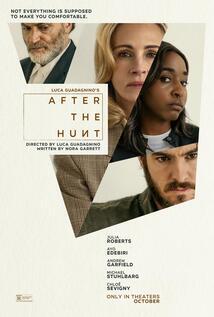

Luca Guadagnino is becoming as prolific these days as post-retirement Soderbergh (not that that's a good thing). His fourth film in three years is my favorite of the bunch, though it's not without problems that a little more time and care might have helped. After the Hunt stars Julia Roberts as a respected Yale philosophy professor on a tenure track who gets caught in the crossfire when her star pupil (Ayo Edebiri) accuses her colleague and close friend (Andrew Garfield) of sexual assault.
The first produced screenplay of Nora Garrett makes no bones about being one of those hot-button issue movies filled with buzzwords, trigger phrases, and hyper verbal speeches in which characters say out loud the things most people in their situations only think. The facts about who's in the right, who's in denial, who's acting in bad faith, who's abusing their position, etc., are all left vague enough that each viewer will come away knowing exactly what happened, even though every accusation leveled at every character is open for interpretation. It's the kind of movie that's meant to "start a conversation," but mostly succeeds in just pissing people off. I must admit, I like movies like this. At least, I like them when they're well written and not shot in ways that telegraph to the audience precisely what side the filmmaker is on. After the Hunt qualifies.
The heightened dialogue isn't exactly David Mamet, but that's a good thing, considering Mamet's effort on this subject, Oleanna, is hardly one of the playwright's best works (and he's never been very good at arguing both sides of an issue). I'd have loved to have seen a version of this film written by Yasmina Reza. I bring up these playwrights because After The Hunt could easily have been a play, with only five major roles and a handful of supporting parts that feature in one or two scenes. Still, the movie seems to want to evoke cinematic influences. The title can't help recall the best movie about this subject, Thomas Vinterberg's The Hunt (though the issues and character types are entirely different in that film).
The film's title sequence is done in the exact style of a Woody Allen film, right down to the Windsor Light Condensed and alphabetical stars and co-stars. By evoking the most well-known cinema-related case that everyone on both sides is 100 percent convinced they know the truth about, even though no one actually can, Guadagnino presses the audience's buttons before a single image or word of dialogue is spoken. It's very cheeky. Unfortunately, that choice also makes us think we might be in for a gorgeously photographed, elegantly edited movie. But we don't get the disarmingly warm celluloid photography of Carlo Di Palma or the golden-hued digital imagining of Vittorio Storaro. Instead, we get the sluggy, generically lit frames typical of contemporary movies. Guadagnino and cinematographer Malik Hassan Sayeed shoot too many of the sequences in awkward masters that are great for exposition scenes, but work against the actors in key moments like the scene where Edebiri first confides in Roberts. The score by Trent Reznor and Atticus Ross is intrusive and distracting.
Mixed bag that it is, the frustrating and alienating aspects of this movie work mostly to its advantage. I'd have rated it higher if the filmmakers had nailed the ending, but neither of the film's two concluding scenes works the way it should. The penultimate scene is far more effective than the epilogue, which wraps everything up too neatly. Still, I had trouble squaring Roberts' emotional confession to her husband (Michael Stuhlbarg), which should land the movie's most devastating emotional punch. It works thematically, but I'm not sure I buy how the character arrived at this point in her mind and heart.
Julia Roberts plays a Yale philosophy professor caught in a crossfire when her star pupil (Ayo Edebiri) accuses her friend and colleague (Andrew Garfield) of sexual assault in Luca Guadagnino's intentionally frustrating, alienating, and often funny conversation piece.




